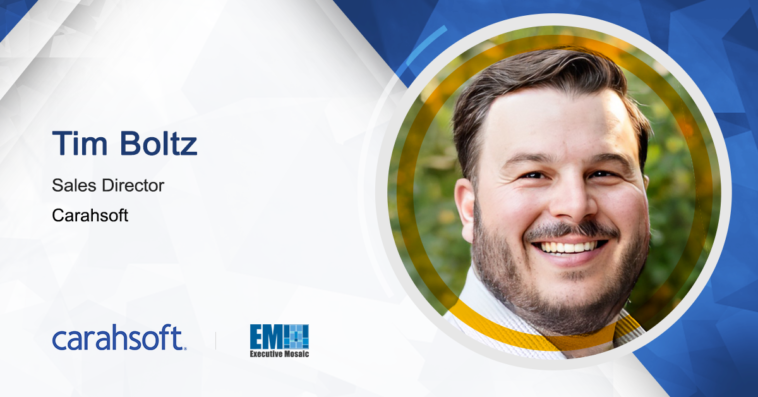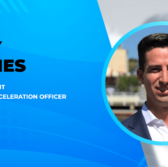No technology has generated more buzz in the past year than artificial intelligence. According to McKinsey, generative AI has $1 trillion of improvement potential in the world of healthcare. However, AI is still an extremely new technology, rife with challenges, and it cannot reach its full potential without buy-in from government, healthcare institutions and patients alike.
Executive Mosaic recently spoke with Tim Boltz, solutions vertical lead of Carahsoft’s healthcare business, about the current state of the industry, including important considerations for successfully harnessing value from varying applications of AI. Boltz has worked with hundreds of healthcare organizations during his 15 years at Carahsoft and has a comprehensive understanding of the healthcare landscape.
In this Executive Spotlight interview, Boltz shares his perspective on the current state of healthcare technology and his predictions for the future.
ExecutiveBiz: What technology is generating the most excitement and innovation in the healthcare space?
Tim Boltz: AI in healthcare is still a nascent and largely abstract technology, but it’s generating tremendous excitement, interest and funding. While AI is already being used in pockets of the healthcare landscape, we’ve hardly scratched the surface of its potential. I liken the advent of AI to the birth of the internet. In the beginning, the scope of the internet was unclear, but it’s now omnipresent. For AI, there’s an exponential curve as far as discovery goes.
Personally, I’m incredibly excited about the possibility for AI to create more effective medicine and treatment for patients, and even find cures for rare diseases. The staggering computational power of AI will fast-track the ability to conduct life-saving research, for example.
Simultaneously, hospitals and care providers are still dealing with lingering workforce shortages from the pandemic. Front-line nurses and administrative staff alike are extremely burnt out. Using AI to automate administrative tasks can free up physicians and clinicians to focus more on delivering excellent patient care. However, to embrace AI’s full potential, we need support and participation from the government and public alike, as developing an AI tool without data is impossible.
ExecutiveBiz: How should the government support AI in markets such as healthcare?
Tim Boltz: The government’s role is twofold: creating governance frameworks and incentivizing providers. Data is the main driver of AI. On the one hand, AI has the potential to improve care for underserved populations. But if large health systems like the Mayo Clinic and Cleveland Clinic have better technology and larger data sets than small hospitals, it could also breed inequality at the institutional level. The federal government needs to step in to address inequality and data privacy, including updating HIPAA to account for modern tools.
The federal government can also drive AI adoption through Medicare and Medicaid reimbursements. If providers are using AI effectively, there should be cost savings—not a cost increase. Similarly, updating policies around reimbursements for telemedicine can also incentivize adoption. My team at Carahsoft is working hard to facilitate conversations at trade shows and industry events and with our customers about governance and reimbursements. It’s crucial for industry and government to be in communication, and we’re proud to serve as a bridge between them.
ExecutiveBiz: What is the biggest hurdle to technological progress in healthcare?
Tim Boltz: One of the biggest challenges in the healthcare space is the rising rate of cyber incidents. Healthcare providers are still recovering from the pandemic, are being forced to do more with less and balance sheets remain tenuous. Most healthcare institutions aren’t able to invest in cybersecurity technologies and those that can often have workforce shortages in their IT departments as well. The federal government can and must help providers get the money they need to protect themselves from a cybersecurity perspective.
The federal government should also provide cybersecurity standards for healthcare providers, so that they can focus on providing modern care that protects sensitive patient data. The U.S. Department of Health and Human Services has offered some guidance on how healthcare organizations should respond to cyber incidents, but more can be done. The federal government’s Cybersecurity Maturity Model Certification aligns security standards for the entire defense industrial base, for example. Something similar should be implemented for healthcare providers. If the industry becomes more secure, hackers will go elsewhere.
ExecutiveBiz: How does Carahsoft work with healthcare partners to help advance their goals?
Tim Boltz: Carahsoft works to bring together best-in-class technologies for the healthcare sector and collaborates directly with healthcare institutions and technology vendors to connect the right solutions to the right challenges.
Some of the most common challenges are that providers often have a lack of funding and a lack of protections. From a funding perspective, we assist providers in applying for grants and other funding vehicles for R&D related to AI. We also negotiate agreements related to the security protocols that providers need to implement new technology. By telling them which vendors have already agreed to the requisite protocols, they can negotiate deals and deploy new technology much more quickly.
Healthcare is truly a passion project for me. I am deeply excited about the potential of technologies like AI in healthcare and encouraged by the innovative leaders that I get to work with every day.





